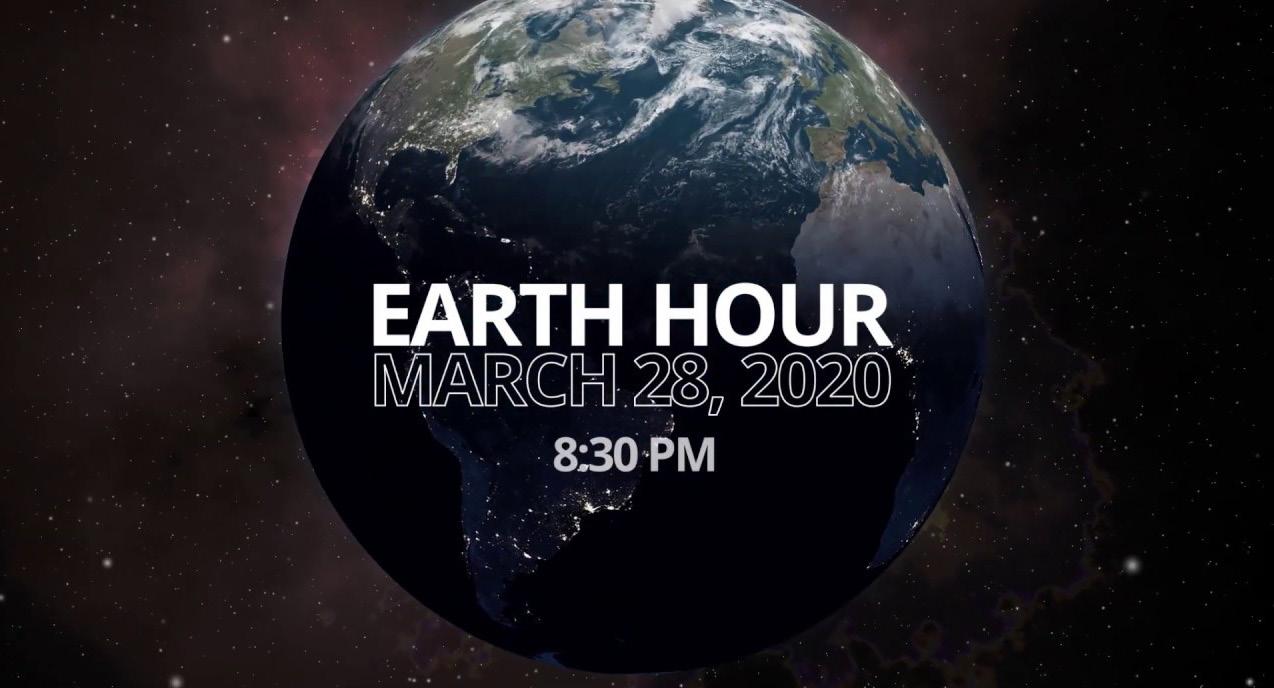
4 minute read
TURN UP THE DARK
By Taylor Lieberstein
TURN OFF THE LIGHTS AND TURN ON THE STARS: EARTH HOUR 2020.
Climate change has been on the radar for decades. Long before Tennessee’s own Al Gore’s An Inconvenient Truth was made mandatory watching in high schools, scientists continued to warn citizens and leaders around the world of the dangers of fossil fuels, of corporate greed, and destruction of the environment. To see the world in 2020 is to see a world that is dealing with the serious and detrimental impacts of climate change. We’re the first generation to know for sure that we are destroying our planet. And we could be the last that can do anything about it. Protecting nature is one of the most immediate, powerful, and cost-effective solutions to the climate crisis.
We live in an interconnected world. Every action we take impacts life around us, and increasingly those impacts are harmful. Our ever-growing demand for food, water, and energy is changing the climate faster than predicted and it comes at a cost for wildlife, wild places, and people everywhere. In some parts of the world, flooding has forced people to flee their homes, while drought has led to severe food and water shortages, creating civil unrest and in some instances armed conflict. Many people are developing what psychologists are calling “eco-anxiety,” a term used to refer to the anxiety experienced as a result of a future planet made unbelievable by climate change.
Every year, millions of people around the world take part in the global conservation effort that began in 2007 by the World Wildlife Federation (WWF) in Sydney. As the name suggests, Earth Hour invites everyone around the world to participate in a day devoted to the planet. For an hour, the aim is to go dark and take part in a movement that casts a bright light on stronger action on climate change to protect our planet. Many major landmarks and neon signs are switched off for the hour and they are extremely noticeable. You may be able to see dramatic changes in large business districts or at iconic landmarks and buildings around the world and in your city.
To show support for our Earth turn off all non-essential lights for an hour on Saturday, March 28, 2020 at 8:30 p.m. Aside from going lights out for the hour, the movement encourages individuals, schools and workplaces to think about their own habits and how they can make these more environmentally friendly. For many Earth Hour is the beginning of a journey that goes far beyond a single hour. This movement has encouraged many people to make changes that reduce their impact on climate change such as adjusting what they eat, where they shop and which energy sources they use.

Earth Hour is now one of the world's largest grassroots movements for the environment. Held every year on the last Saturday of March, Earth Hour engages millions of people in more than 180 countries and territories, switching off their lights to show support for our planet. 2020 presents an unmissable opportunity. In 2020, world leaders will come together during key global conferences and forums to set the environmental agenda for the next decade and beyond. Crucial political decisions will be made on climate action, nature, and sustainable development- decisions that will directly affect the fate of humanity and our planet for years to come.
With enough support, Earth Hour 2020 could be a spotlight moment that puts nature at the center of international conversations. Together, we can speak up and show world leaders and other decision-makers around the globe that nature matters and urgent action must be taken to reverse nature loss. Every year supporters across the globe celebrate Earth Hour through this one iconic action, switching off the lights. The action is small but the overall mission it is so much more than that. It is a symbol of unity. It is a symbol of hope. It is a symbol of power in collective action for nature. This Earth Hour 2020 do your part for nature to let world leaders know that you demand action to reverse nature loss and protect our planet.
On March 28th at 8:30pm switch off non-essential lights in your homes, businesses, schools and on signage during Earth Hour from 8:30 p.m. to 9:30 p.m. For businesses that are closed over the weekends ensure your employees switch off lights when they leave on Friday evening.
For larger buildings, plan with facilities and building managers to manage the logistics of switching off non-essential lighting for Earth Hour including neon lights – in and around your properties.
Post messages on all your social media channels, using #Connect2Earth. Tell everyone about why your organization is partaking in Earth Hour. Encourage your staff, family and friends to do the same.
Earth Hour has grown to become one of the world's largest grassroots movements for the environment, inspiring individuals, communities, businesses and organizations in more than 180 countries and territories to take tangible environmental action for over a decade. Historically, Earth Hour has focused on the climate crisis, but more recently, Earth Hour has strived to also bring the attention to the pressing issue of nature loss. The aim is to create an unstoppable movement for nature and to create solutions to the planet’s most pressing environmental challenges and harnesses the collective power of its millions of supporters to drive lasting change.



